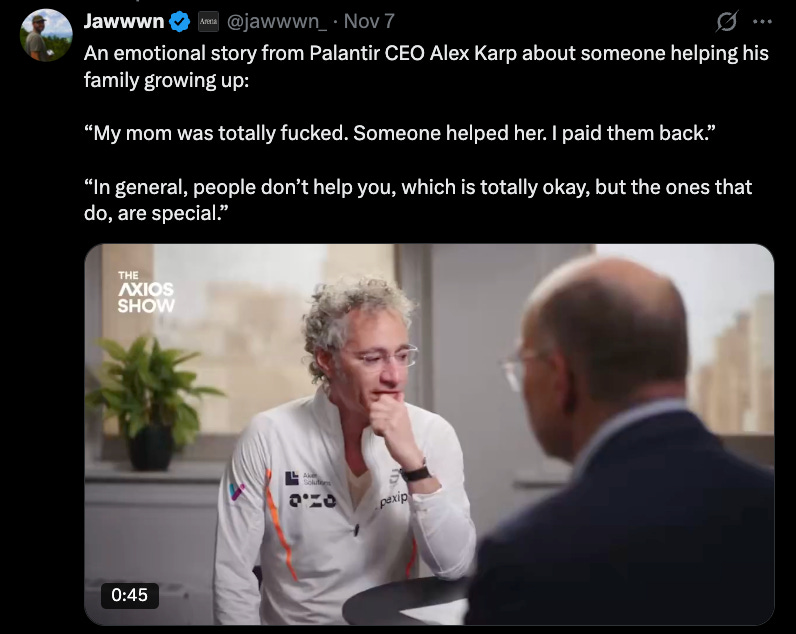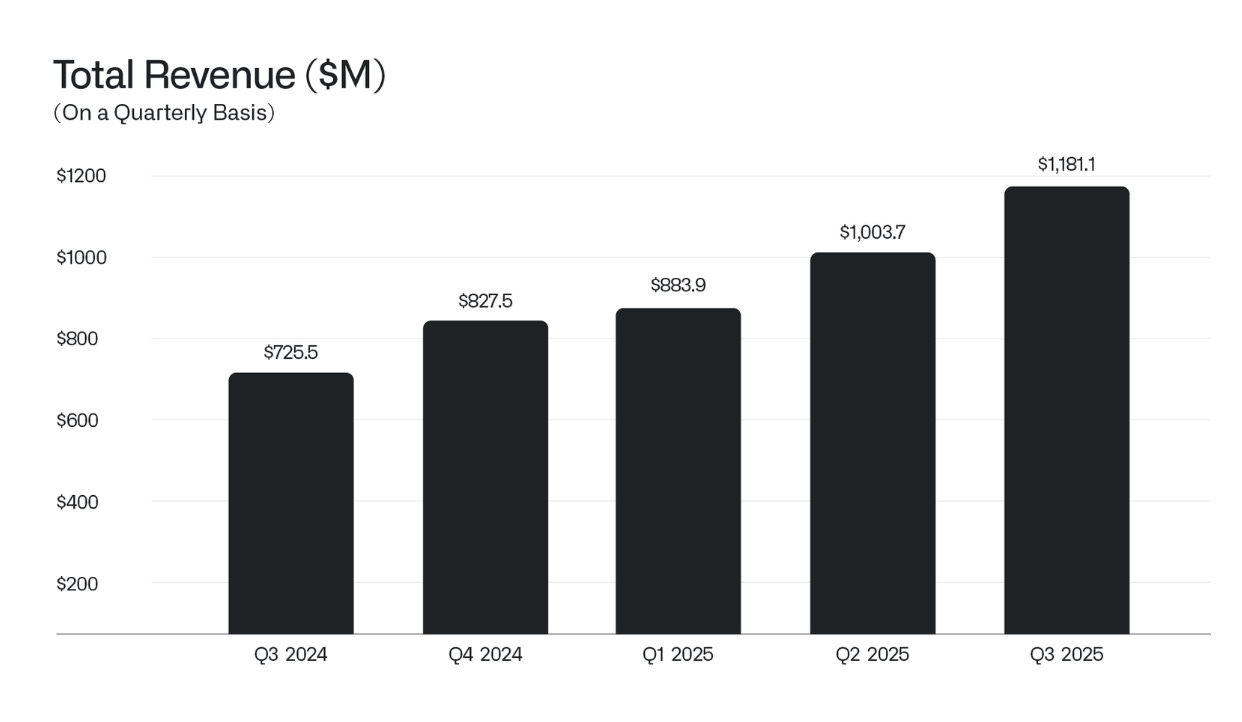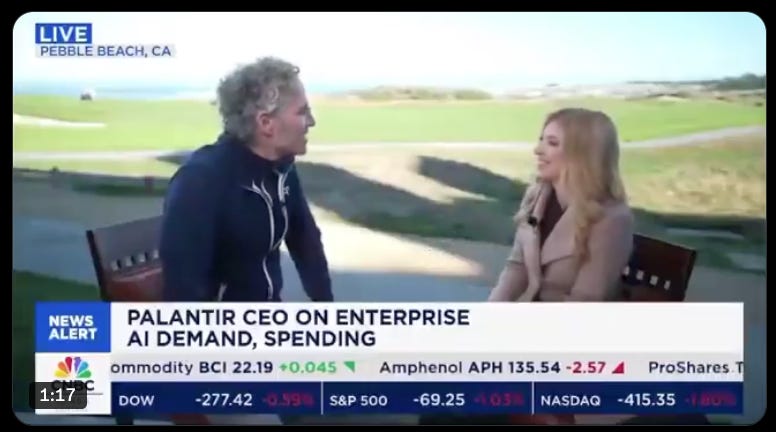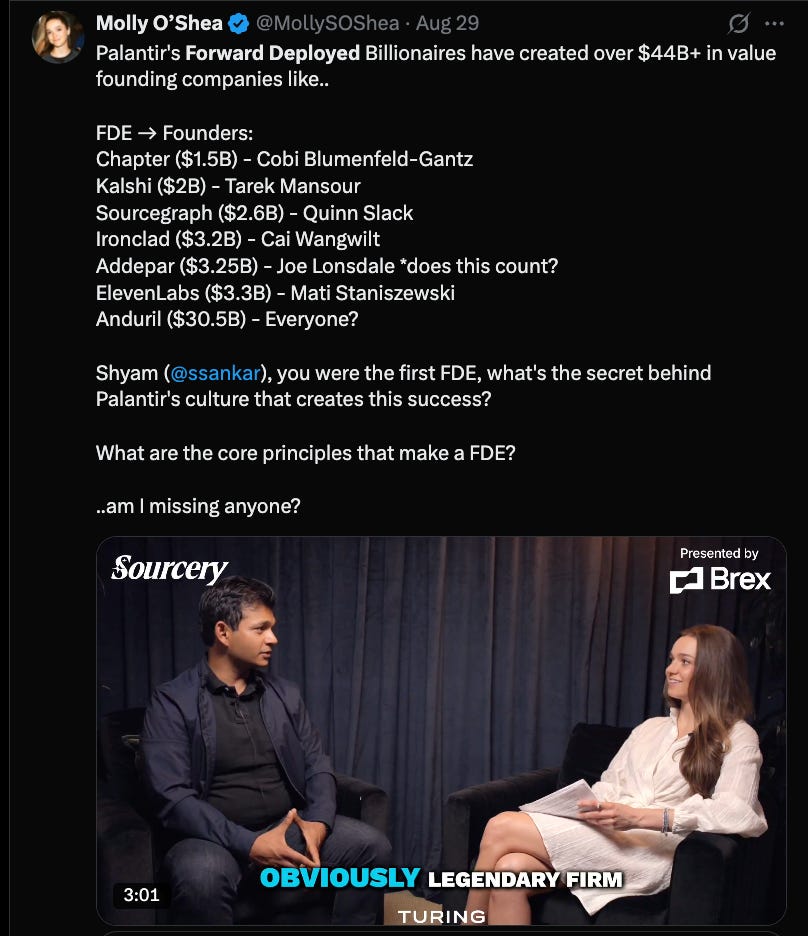BREAKING: Inside Palantir w/ CEO Alex Karp
Interview at PLTR
Alex Karp, PLTR
Alex Karp, CEO of Palantir, joins Molly O’Shea for a rare look inside Palantir (physically.. inside their office).
Fresh off record earnings (& technically the first long form interview he did afterwards), hitting nearly a $500B market cap, & the new release of The Philosopher in the Valley, Alex Karp shares how Palantir went from an outsider idea into one of the world’s most influential software companies.
→ Listen on X, Spotify, YouTube, Apple
In this conversation, Karp unpacks how AIP has become the operating system for the AI era, powering U.S. defense, industrial, and commercial sectors while redefining how enterprises make decisions. He also reflects on how his dyslexia shaped Palantir’s culture of intuition, meritocracy, & creative iteration - a company built on conviction over consensus.
Ultimately, Karp argues Palantir’s mission goes beyond software: it’s about helping Americans win. From empowering soldiers and engineers to delivering venture-style returns to retail investors and private-equity outcomes to enterprise clients.
The conversation connects philosophy and business, revealing how Palantir’s DNA: equal parts artistry, pragmatism, and moral clarity, has produced one of the most resilient and valuable companies of the 21st century.
Special thank you to Eliano for the strategic vibes & the Palantir team for helping put this together!
Fun BTS extras + write up below!
Timestamps
(00:00) Inside Palantir with Alex Karp
(02:16) Building without hierarchy — the anti-playbook culture
(05:00) Artistry & conviction in product creation
(06:45) Ignoring consensus & betting on vision
(08:45) Helping Americans win — soldiers, workers, investors
(11:00) Moral conviction & the foundation of Palantir
(13:00) Meritocracy, realism, & Western values
(15:41) The Eisenhower Award & moral leadership
(19:45) Dyslexia, intuition, & leading through instinct
(22:38) Value creation vs. hype in the AI boom
(26:19) Launching AIP — Palantir’s turning point
(28:30) AIP as the operating system for the AI era
(33:15) Rosita — family, grounding, & perspective
(39:55) Cupcakes
Brought to you by:
Brex—The intelligent finance platform: cards, expenses, travel, bill pay, banking—wrapped into a high-performance stack. Built for scale. Trusted by teams that move fast.
Turing—Turing delivers top-tier talent, data, and tools to help AI labs improve model performance, and enable enterprises to turn those models into powerful, production-ready systems. Visit: turing.com/sourcery
Carta—Carta connects founders, investors, and limited partners through software purpose-built for private capital. Trusted by 2.5M+ equity holders, 65,000+ companies in 160+ countries, Carta’s platform of software & services lays the groundwork so you can build, invest, and scale with confidence. Visit: Carta/Sourcery
Kalshi—The largest prediction market & the only legal platform in the US where people can trade directly on the outcomes of future events (sports, politics, weather, AI, etc).
Becoming the “Philosopher in the Valley”
Alex Karp’s childhood in Philadelphia was defined by contrast: artistic yet disciplined, culturally rich yet socially unconventional. His mother was an artist, his father an academic, and the household immersed him in museums, literature, and philosophy from an early age. While dyslexia made reading difficult, it also shaped how he processed the world: he learned to think visually, make fast non-linear connections, and question structure rather than accept it. Those habits later became central to how he leads Palantir, moving quickly, relying on intuition, and valuing originality over conformity.
Growing up biracial in a heavily Jewish, pro-Israel environment, Karp often describes himself as an “outsider among outsiders.” The experience gave him a lifelong fixation on independence and rule-of-law societies, places that protect dissent, self-expression, and the rights of individuals who don’t fit the norm. These convictions, combined with an upbringing steeped in Western art and moral philosophy, became the foundation for how he thought about power, governance, and technology.
A Philosophical Education
Haverford College - B.A., liberal arts focus emphasizing moral philosophy and political theory.
Stanford Law School - J.D.; met Peter Thiel and began a long-running debate on politics, free expression, and governance.
Goethe University Frankfurt - Ph.D. in philosophy, focused on post-war German thought and critical theory under Jürgen Habermas and Niklas Luhmann.
His years in Frankfurt convinced him that Europe’s intellectual elite had become paralyzed by analysis, brilliant in critique but unable to build. That realization pushed him back toward action. He concluded that real progress required builders who could translate ideas into systems that move institutions forward, an ethos that later shaped Palantir’s culture of applied intelligence and pragmatic execution.
Founding Palantir
After completing his Ph.D. in philosophy at Goethe University in Frankfurt, Alex Karp returned to the U.S., where he reconnected with Peter Thiel, a friend and intellectual sparring partner from their days at Stanford Law School. The two shared a belief that Western societies needed stronger, more accountable technological systems, especially in the wake of 9/11, when intelligence agencies struggled to connect critical data.
That conviction led them to co-found Palantir Technologies in 2003, alongside Joe Lonsdale, Stephen Cohen, and Nathan Gettings, many of whom came from the PayPal network. Thiel provided the initial funding, while Karp became CEO, bringing philosophical depth to a company designed to merge cutting-edge software with moral and strategic purpose. Together, the founding team built Palantir not just as a data platform, but as a tool to help Western institutions operate with precision, transparency, and alignment to democratic values.
The early vision was to create software that strengthened the West without undermining civil liberties: a platform powerful enough for defense and intelligence, yet transparent and governed by law. Palantir’s purpose was never just data analytics; it was moral architecture coded into technology.
From the start, Karp rejected hierarchy and bureaucracy. Palantir’s culture favored small, autonomous teams of elite engineers embedded directly with users, the now-famous “forward-deployed engineer” (FDE) model. This approach collapsed the gap between development and deployment, ensuring every line of code solved a real problem. It also made Palantir deeply meritocratic: decisions were driven by insight and results, not title or tenure.
Though the company was consistency met with heavy skepticism from both Silicon Valley and Washington, Palantir pushed through. Venture firms saw little upside in serving government clients, and bureaucracies distrusted outsiders. Yet Karp’s conviction was that enduring value lay in building for mission-critical systems like defense, intelligence, healthcare, energy, and not in chasing consumer hype. That focus allowed Palantir to become one of the few technology companies that directly shaped national and industrial infrastructure while remaining aligned with democratic ideals.
Recent Milestones
Sept 30, 2020 - PLTR direct listing on the New York Stock Exchange (NYSE)
Apr 7, 2023 - Palantir releases Artificial Intelligence Platform (AIP)
Sept 23, 2024 - Inclusion in S&P 500
Mar 2025 - Stock hits $100/share
Jun 2025 - Launching The American Tech Fellowship
Oct 2025 - Stock hits $200/share
Nov 2025 - Hitting nearly $500B market cap
US UK JP KR
Karp’s First Book: The Technological Republic
Karp’s 2024 book, The Technological Republic, written alongside Palantirian Nicholas Zamiska, expands the same worldview into a broader diagnosis of the West. It argues that Western societies risk losing their edge not because of weak technology, but because of moral drift and a failure of purpose. The book distinguishes between “hard power” (the ability to build + defend) and “soft belief” (the moral clarity that guides what we build & why).
He contends that the West’s future depends on restoring the balance between the two. Silicon Valley’s talent and capital remain unmatched, but without conviction or alignment with national purpose, they generate trivial products instead of civilization-scale systems. The book calls for a renewed technological statecraft, where U.S. innovation serves democratic stability, societal strength, and a global staying power, rather than distraction or polarization.
New Biography: Philosopher in the Valley
The Philosopher in the Valley, written by Michael Steinberger offers an intimate portrait of Alex Karp, tracing how a dyslexic, art-immersed outsider from Philadelphia became one of Silicon Valley’s most unorthodox CEOs, his relationship with Palantir co-founder Peter Thiel, and how the company’s technology relates to surveillance, data privacy, and the government’s role in society.
The biography captures the tension between his academic roots in European philosophy and his practical mission to defend Western democracy through technology. It chronicles his evolution from debating critical theory in Frankfurt to co-founding Palantir in Palo Alto, where he built a company that fused moral conviction with engineering precision.
Rather than portraying Karp as a traditional tech executive, The Philosopher in the Valley frames him as a thinker-builder, someone who sees code as a medium for ideas, leadership as a creative act, and technology as a moral responsibility. Through behind-the-scenes accounts of Palantir’s early struggles, cultural battles, and eventual ~$500B rise, the book explores how Karp’s philosophy of conviction over consensus shaped both the company’s identity and its impact on geopolitics, defense, and the emerging AI economy.
Note: It was incredible.
(& got me back into the joy of reading - highly recommend books)
Pictured: Molly reading book (taken by Charlotte, Head of Special Ops)
Record Earnings: A Note to “Player Haters” + “Short Sellers”
In his Q3 2025 Letter to Shareholders, Alex Karp delivered what can only be described as poetically triumphant yet artfully spiteful.
Nonetheless, a reflection on Palantir’s record-breaking performance and a pointed message to the “player haters and short sellers” who still don’t understand the company’s momentum.
“Our business generated $1.2 billion in revenue for the third quarter,” he wrote, “a new record in our more than twenty-year history,” alongside $476 million in profit “nearly half a billion dollars in only three months.”
Palantir, he reminded readers, is now “producing more profit in a single quarter than it did in revenue not long ago,” an “otherworldly” growth rate that has “confounded most financial analysts and the chattering class.”
The tone is equal parts victory lap and moral manifesto. Karp portrays Palantir’s rise as proof that conviction-based building still beats market cynicism, that software grounded in mission and discipline can outperform speculation.
“Some of our detractors have been left in a kind of deranged and self-destructive befuddlement.”
Case-in-point, betting against Palantir isn’t just a bad trade, it’s a misunderstanding of what the company represents: a deeply American belief that innovation, hard power, & moral clarity still matter.
At a time when AI is reshaping the economy and widening the gap between classes (ie Elon Musk’s $1 trillion pay package - $1T!!) Karp argues that Palantir represents the opposite: a company using AI to strengthen institutions, empower workers, all the while providing Venture returns to everyday Americans, & securing the West’s technological edge.
“Today, America is the center, and it must hold,” he wrote, warning against the “vacant and hollow pluralism” that erodes shared identity. Palantir’s record quarter, he suggests, isn’t just about earnings, it’s a reaffirmation that building for mission, country, and conviction still outperforms speculation, no matter what the “player haters” think.
“I don’t like short sellers... I think what was happening was market manipulation. I strongly suspect he was getting out of his position. And to get out of his position, he had to screw the whole economy...”
A Generational Leader
At the end of it all, Alex Karp stands out as one of the few modern CEOs whose convictions have remained unchanged across decades. His expansive worldview grounded in morality, civil liberties, & Western resilience, has guided Palantir from its outsider beginnings to the center of the global AI era. All the while, developing quite the cult following of Palantirians, & passionate retail investors, who admire his commitment to his personal principles, meritocracy, and the perseverance of the American spirit.
Karp’s belief that technological dominance must serve democratic values has become more than a ‘corporate’ philosophy; it’s a blueprint for how the West can maintain strength without losing its soul.
P.S. Have you seen Alex Karp’s sword??
As a Result..
Over $50B+ in Value Creation: FDE → Founders
Palantir’s forward deployed engineer (FDE) model, by embedding elite technical talent alongside customers to solve mission-critical problems, has become one of the most influential playbooks in modern technology (& now copied across industries worldwide). That ethos of conviction, proximity, and relentless execution has inspired a new generation of FDE alumni turned founders who’ve created more than $50+ billion in enterprise value across frontier sectors.
Anduril ($30.5B), co-founded by Palantir alumni Brian Schimpf, Matt Grimm, and Trae Stephens (alongside Palmer Luckey), redefining defense & autonomy
Tarek Mansour’s Kalshi ($9B - now rumored to be $12B), transforming prediction markets into financial infrastructure
Mati Staniszewski’s ElevenLabs ($6.6B), pioneering generative voice AI
Cai Wangwilt’s Ironclad ($3.2B), modernizing business contracting
Quinn Slack’s Sourcegraph ($2.6B), scaling developer intelligence
Cobi Blumenfeld-Gantz’s Chapter ($1.5B), rebuilding compliance for the next era of enterprise software.
Merch Highlight Reel
Must-Read:
The Philosopher in the Valley: Alex Karp, Palantir & the Rise of the Surveillance State – by Michael Steinberger
The Technological Republic: Hard Power, Soft Belief, & the Future of the West - Alexander C. Karp, Nicholas W. Zamiska
Resources
All-in Summit: Michael Ovitz on closing Palantir’s first enterprise deal
Joe Lonsdale Interview: Alex Karp On The Future Of AI & Building A Multi Billion-Dollar Company
Must Watch: Palantir CEO emotionally recalls the jewelry store owner who sheltered his family
Axios Interview: Palantir’s Alex Karp on government surveillance, AI & the Democratic party
Brought to you by Brex:
Brex is the intelligent finance platform: cards, expenses, travel, bill pay, banking—wrapped into a high-performance stack. Built for scale. Trusted by teams that move fast.
Spend smarter. Move faster. Sourcery subscribers get: 75,000 points after spending $3,000 on Brex card(s). Plus, white-glove onboarding, $5,000 in AWS credits, $2,500 in OpenAI credits, and access to $180k+ in SaaS discounts. On top of $500 toward Brex travel, $300 in cashback, plus exclusive perks (like billboards..) visit → brex.com/sourcery
















Crushed it!
The point about AIP becoming the operating system for the AI era really resonates. What Karp has built isnt just software but a whole infrastrucure for decision making that actually serves democratic values. The FDE model creating $50B+ in value through alumni founders like Anduril and Kalshi shows the culture realy works.